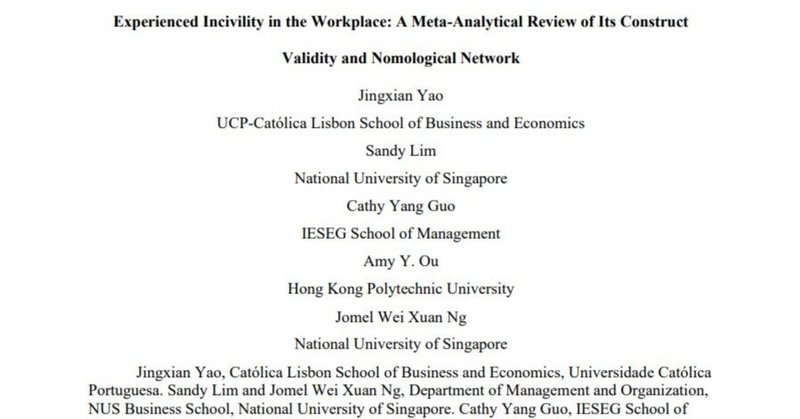
(図表なし)Experienced incivility in the workplace: A meta-analytical review of its construct validity and nomological network
Abstract
職場のincivilityは組織の研究で注目されてきたが、職場における不当な扱いと比較して構成概念の妥当性への疑問がある。incivilityのantecedentsは不明確であり各要因間のnomological networkも定かではない。そこで、Schmidt & Hunter (2015) のランダム効果メタ分析の手法を用いて信頼性、収束的妥当性、弁別妥当性および増分妥当性の検証を通じて構成概念妥当性を示すこととした。また、nomological networkに加害者の要素を加えて拡張することとした。
105の研究51,008名の対象者に基づき、incivilityの構成概念妥当性を示した。さらに、antecedents, moderator, outcomの強い関連も示した。最後に、理論的及び実践的な示唆を述べた。
Introduction
Workplace inciviliy は、”low-intensity deviant behavior with ambiguous intent to arm the target, in violation of workplace norms for mutual respect" (Andersson & Pearson 1999) で定義される
70%の従業員がinicivilityを経験する
定義にもかかわらず、incivilityは、仕事と健康のアウトカムに負の影響を及ぼす
例えば、well-being、仕事満足度、organizational citizenship behaviors、退職意思、仕事に逆効果な行動に影響を及ぼす
様々な研究でincivilityの職業生活への負の影響が占めさえれているが
構成概念の実践的な支持にかけている点でさらなる研究が制限されている
得にほかの類似するmistreatmentの概念とアウトカムが類似している点が指摘されている
したがって
第一の目的は、aggressive behavior, abusive supervision, sexual harassment, undermining, ostracismとの異動を含めた構成概念の妥当性を示すことである
第二の目的は、実践研究のデータを用いてincivility antecedentsを明らかにすることである
第三の目的は、perpetrator predation frameworkの導入によって、antecedents (特にパーソナリティー) がmistreatmentを呼び込んでいる?(引き起こしているようなニュアンス) という発想をこえる
Construct Validity of Incivility
incivilityは強度は弱く身体的ではないmistreatmentである
incivilityは傷つける意図が不明確である
incivilityは性別や年齢にかかわらないgenericなものである
incivilityのアウトカムへの影響がほかのmistreatmentと独立していることにより妥当性を示す
Empirical Examination of Incivility's Construct Validity
同じ内容を測定している複数の尺度は高い相関を示すだろう
関連する尺度とは中程度の関連を示すだろう
無関係な概念とは低い関連を示すだろう
アウトカムに対して関連概念による予測に加えて増分妥当性を示すだろう
Hypothesis 1: Experienced incivility, above and beyond other forms of mistreatment, exerts a positive effect on negative affect, a positive effect on injustice perceptions, a negative effect on job satisfaction and affective commitment and a positive effect on turnover intention, a negative effect on OCBs and a positive effect on CWBs, a negative effect on task performance, and a negative effect on well-being.
Antecedents of Experienced Invcivility
Perpetrator Predation Framework
perpetratorは自己防御の方法を持たないものたちをターゲットにするだろう
一般的に好意を持たれにくく一緒に働きたくないと思うものをターゲットにするだろう
incivilizationが受け入れられている環境で自制心を感じなくなっているだろう
perpetrator predation frameworkはcontext of perpetratorが加味されている点で異なる
Demographic Characteristics and Experienced Incivility
predetorのジャッジメントに影響する属性がantecedentの候補
tenureもそのひとつ
perpetratorは彼らを自分を守ろうとする意図が弱いと判断する
Hypothesis 2: (a) Women and (b) racial minorities experience more incivility than men and racial majorities, respectively, and (c) education, (d) rank, and (e) tenure are negatively related
to experienced incivility
Personality Traits and Experienced Invilility
Hypothesis 3: (a) Agreeableness, (b) conscientiousness, and (c) extraversion are negatively related to experienced incivility, (d) neuroticism and (e) negative affectivity are positively related to experienced incivility, and (f) self-esteem is negatively related to experienced incivility.
Perpetratorが弱者を見つけ出すプロセス
Contextual Factors and Experienced Incivility
知覚されたサポーティブな職場環境
Hypothesis 4b: Perceived socially supportive climate is negatively related to experienced incivility.
Comparing Associations Between Different Antecendents and Experienced Incivility
先行研究で示されている人または環境によるincivilityの予測効果と、本モデルであつかうantecedentsによる予測効果を比較する
Research Question: Do demographic characteristics, personality traits, or contextual factors have a stronger association with experienced incivility?
Method
Literature Search
key words: incivility, uncivil, work, organization, job, employee, management
manually searched journal: Academy of Management Journal, Journal of Applied Psychology, Journal of Management, Journal of Occupational Health Psychology, Organizational Behavior and Human Decision Processes, and Work and Stress
referenceからも文献検索
包含基準:実証研究、ゼロ次の相関分析、相関係数に変換できる効果量が算出される、incivilityが測定されている
除外基準:サイバーincivilityなど組織に関係ないもの、テレビ放送による政治的incivility
合計89論文、107サンプル、51,578対象者、68論文はピアレビュー、21論文は非公開論文
コーディング・メタ分析方法
変数のカテゴリ分けと相関係数抽出
Using STATA
ランダム効果メタ分析
測定誤差 (信頼性係数で調整)とサンリング誤差
95%信頼区間 (サンプリングエラー)と信用区間 (サンプリングエラーを統制したもの)の算出
統計誤差及びQstatics (<75%var or significant Q indicates that the meta-analyzed relationship has potential moderators)
trim and fill analysis
deltaK (potentially missing studies)
adj-r(filling potentially missing studies)
Results
Reliabiliy, convergent and discriminant validity
weighted Cronbach's alpha = .88, SD=.04, range = .81-.94
incivility measures間の相関はvery high: ρ^=.73 [95%CI =.71-.74], 80%CV excluded zero.
inciviityとother mistreatment measuresの相関はrange = .24-.63、95%CI及び80%CVは0を含まない
incivilityと仕事の要求、仕事のコントロール度は相関なし (ただし、jobdemandについては80%CVの下限が-0.004であり、恣意的な印象も受ける)
Incremental predictive validity and Higher-order mistreatment construct
ほかのmistreatmentを統制しても、incivilityは陰性感情、不公正感、仕事満足度、情緒的なかかわり、退職意思、CWBs、仕事のパフォーマンスに有意な関連を示した
ただし、CWBsはハラスメントとabusive supervisionを統制すると効果が消え、well-beingはsexual harrassment, underminig, ostracism, abusive supervisionを統制すると効果は消えた
総じて、増分妥当性及び他のmistreatmentの調整下におけるアウトカムとの相関が示された
ただしwell-beingに対して固有の成分があるとは言えない (ostracismが最も強い効果を示した)
Antecedents
女性、マイノリティー、階級、在職期間がincivilityを予測するが、効果はとても弱い
Neuroticism,negativeaffectivity, self-esteemがある程度の強さを持って予測する
uncilil climate, socially supportive climateは中程度の強さを持って予測する
Comparing associations between different antecedents and incivility
22の比較のうち19が、demographic variablesよりもcontextual variablesのほうがincivilityを強く予測した
30の比較のうち24が、demographic variables より contextual variablesのほうが incivility を強く予測した
従って、contextua variablesが最も強いincivilityの要因だと考えられる
Outlier Analysis
SAMD statistics により外れ値を設定したがprimary studyには存在しなかった
外れ値除外後の結果は変化なかった
Supplementary Primary Study
結局、mistreatmentの高次構造をメタ分析で行うことができないので普通にインターネットで500名の常勤雇用者にアンケート調査して、incivility のアウトカムに対する増分妥当性と、因子分析を行った
増分妥当性からは、negative affect, injustice perceptions, job satisfaction, turnover intention, CWB, well-beingを予測した
しかし増分妥当性では、affective commitment、OCB、task-performanceに特異的な影響を及ぼさなかった
高次構造を仮定したモデルは統計学的に許容できるものだったが (RMSEA=.07、CFI=.96、TLI=.95、SRMR=.04)、高次構造を仮定しないものは許容できなかった (chi-square p <.01、RMSEA=.20、CFI=.70、TLK=.66、SRMR=.46)
Discussion (重要なところ)
相関でしかない (テンプレート)
メタ分析ではクロスレベルの分析ができない
perceived unlikability や perceived inablity in self-defenceの媒介効果を調べられていない
victimのprovocationを調べられていない
媒介効果の要因や研究が少なすぎて実態に迫っているかわからない
Measure
Cortina, L. M., Magley, V. J., Williams, J. H., & Langhout, R. D. (2001). Incivility in the workplace: incidence and impact. Journal of occupational health psychology, 6(1), 64. (Incivility scale)
Duffy, M. K., Ganster, D. C., & Pagon, M. (2002). Social undermining in the workplace. Academy of management Journal, 45(2), 331-351. (Social undermining)
Ferris, D. L., Brown, D. J., Berry, J. W., & Lian, H. (2008). The development and validation of the Workplace Ostracism Scale. Journal of applied psychology, 93(6), 1348. (Ostracism)
Mitchell, M. S., & Ambrose, M. L. (2007). Abusive supervision and workplace deviance and the moderating effects of negative reciprocity beliefs. Journal of applied psychology, 92(4), 1159. (Abusive supervision)
Tepper, B. J. (2000). Consequences of abusive supervision. Academy of management journal, 43(2), 178-190. (Short version of abusive supervision)
Reference
Andersson, L. M., & Pearson, C. M. (1999). Tit for tat? The spiraling effect of incivility in the workplace. Academy of Management Review, 24, 452-471. (definition of incivility)
Schmidt, F. L., & Hunter, J. E. (2015). Methods of meta-analysis: Correcting error and bias in research findings (3rd ed.). Newbury Park, CA: Sage. (random effect meta-analysis)
Yao, J., Lim, S., Guo, C. Y., Ou, A. Y., Ng, J. W X. (2022). Experienced incivility in the workplace: A meta-analytical review of its construct validity and nomological network. Journal of Applied Psychology, 107, 193-220. (paper of this note)
この記事が気に入ったらサポートをしてみませんか?
